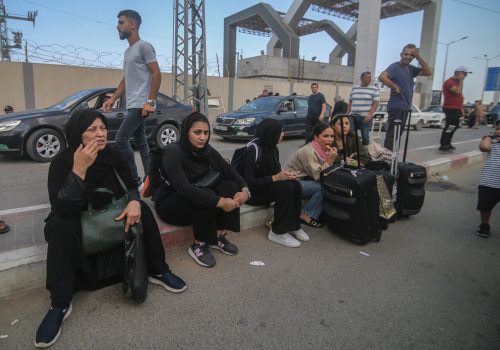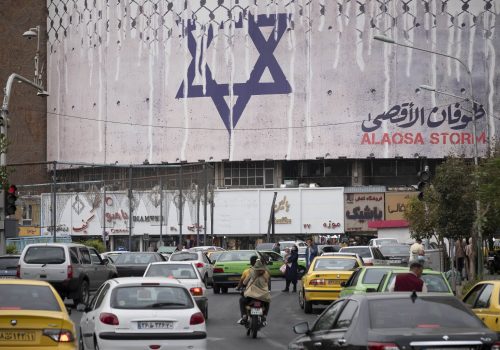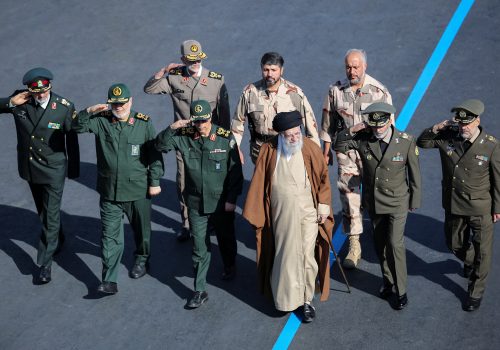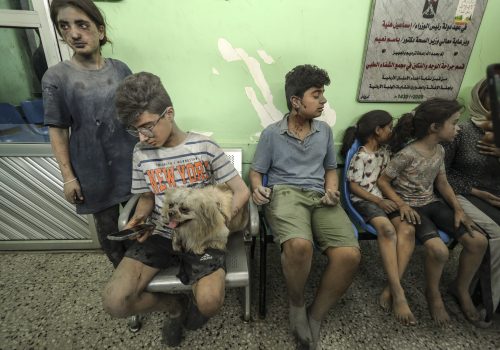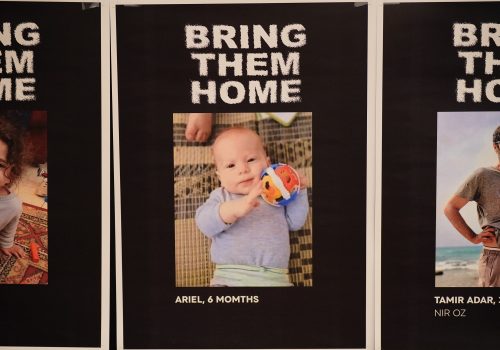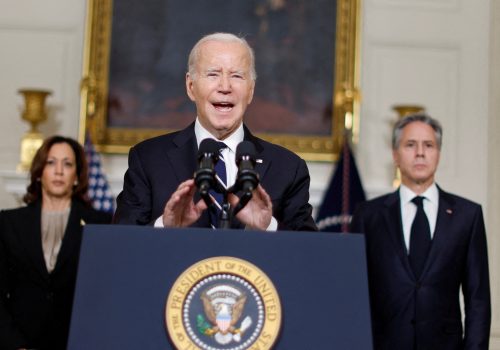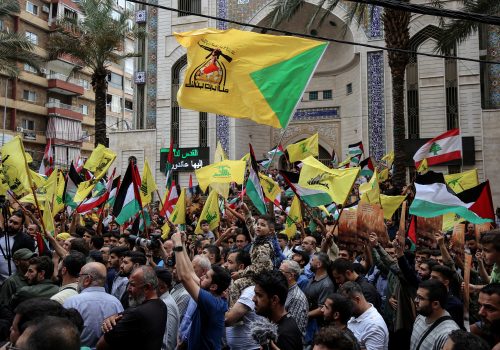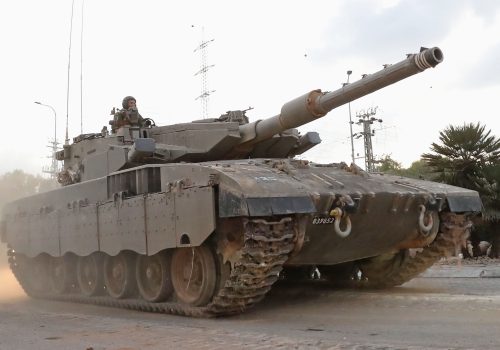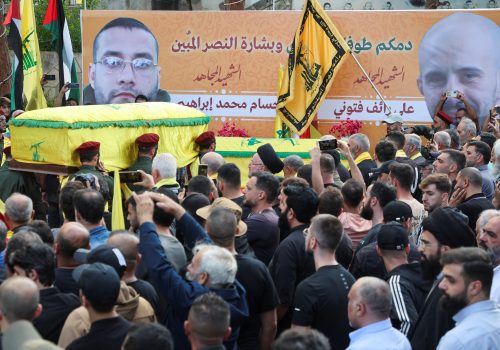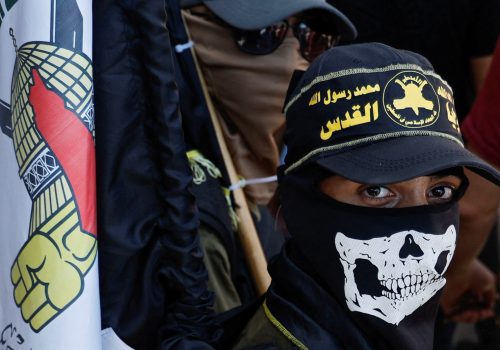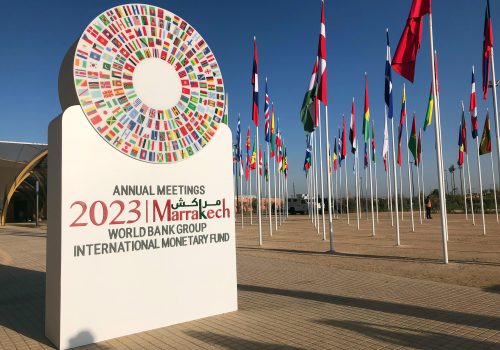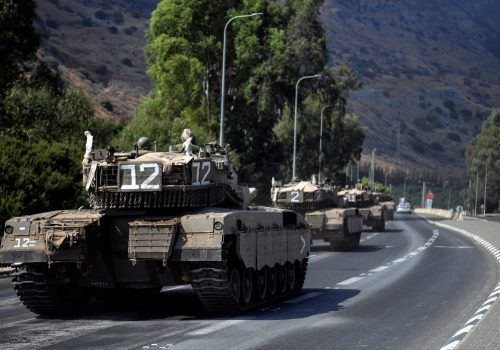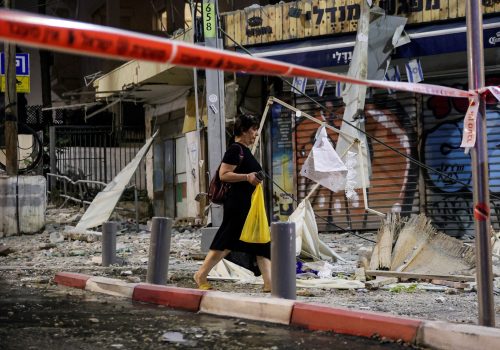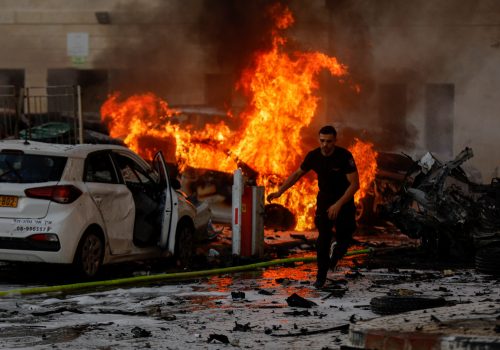Live expertise: Get the latest insight on the Israel-Hamas war
“A 9/11 and a Pearl Harbor wrapped into one.” That’s how an Israel Defense Forces (IDF) spokesperson described the events of October 7, when Hamas unleashed a complex surprise attack on Israel, killing hundreds and taking more than one hundred hostages. Israel is responding with an assault on the Gaza Strip, as fears mount of a multi-front war. Atlantic Council experts are keeping close watch on the emerging conflict and on the reactions in Washington, Tehran, Riyadh, and beyond. Find our analysis below, with updates to come as the story unfolds.
The latest updates
SATURDAY, OCTOBER 14 | 8:56 PM CAIRO
Egypt cornered over Israel’s war on Hamas
Cairo is watching with trepidation as Israel’s bombardment of the Gaza Strip on Egypt’s northern border continues unabated for a week. The Egyptian leadership fears that the violence on its doorstep may spill over into its territory and that Israeli airstrikes would result in a mass exodus of Gazans into the Sinai Peninsula. The fact that Israel has bombed the Rafah border crossing—the main gateway for Gazans to Sinai and the outside world—three times in twenty-four hours between October 9 and October 10 has only compounded Cairo’s fears. …
Some Western leaders and officials are pinning their hopes on Cairo to negotiate the release of hostages abducted by Hamas, given the thaw in relations between Egypt and the militant group, which shares Muslim Brotherhood affiliations. Ursula von der Leyen, president of the European Commission, said she had a “valued exchange” with President Abdel Fattah el-Sisi and had shared her concerns about the fate of the hostages who must be released and returned home safely. In 2015, Egypt rescinded an earlier decision to designate Hamas as a terrorist organization because the court that had issued the ruling had no jurisdiction. The move paved the way for a marked improvement in relations between the two sides.
Egypt, which has long been a key mediator between Israel and the Palestinians and between Palestinian factions, also has strong security ties with Israel. In this latest round of violence, it finds its hands tied as Israel has made clear it rejects any mediation or calls for self-restraint.
Read more from Shahira Amin, a nonresident senior fellow at the Atlantic Council’s Scowcroft Middle East Security Initiative and an independent journalist based in Cairo:
FRIDAY, OCTOBER 13 | 4:09 PM CLEMSON, SC
What do Iranians think of Israel? Their views might surprise you.
A public fireworks celebration at Tehran’s Palestine Square, home of the Palestinian embassy, was organized to celebrate the horrific attacks of October 7 by militant groups Hamas and Palestinian Islamic Jihad, both of whom receive significant military and financial help from the Islamic Republic of Iran. A few dozen gathered, waving massive Palestinian flags and holding up portraits of assassinated Quds Force Commander Qassem Soleimani, who directed the regime’s help to Hamas and other proxies in the region before he was killed by a US drone strike in January 2020. Loudspeakers blasted propaganda songs in Persian and Arabic. One went, “Israel is my enemy; its wiping off the map will bring me a bright future.”
On that very day, Iranian officials took turns declaring open support for the attacks on Israel. Tehran’s Valiasr Square, used for years for in-your-face propaganda posters by the regime, soon featured a fading flag of Israel, supposedly representing the coming destruction of the Jewish State. But before long, on October 10, Supreme Leader Ayatollah Ali Khamenei denied having had a direct operational role.
Ordinary Iranians are raised with this anti-Israel and antisemitic content, which fills television and radio broadcasts and even school textbooks. Yet, anyone familiar with Iranian society knows that anti-Israel attitudes have mostly failed to go beyond the most vociferous supporters of the regime despite years of attempted indoctrination.
Read more from Arash Azizi, author of The Shadow Commander: Soleimani, the US, and Iran’s Global Ambitions:
FRIDAY, OCTOBER 13 | 11:56 AM WASHINGTON
It doesn’t matter whether Iran planned the Hamas attack—Tehran is still to blame
Whether or not Iran helped plan Hamas’s terrorist attack that killed at least 1,300 Israelis is needlessly distracting analysts and the media from the far more important conclusion that we already know: Iran is culpable for the attack.
On Monday, Washington was set abuzz when the Wall Street Journal published a story claiming that Iran helped Hamas plan this past weekend’s mass terrorist attack against Israel. Amwaj.media—a relatively new outfit focused on Iran, Iraq, and the Gulf—posted a competing story shortly afterward in which Iranian officials insisted they were not involved with the operation at all. The Washington Post added to the dialogue by concluding that Iran’s role is not clear. And the New York Times on Wednesday reported that Iran was surprised by the attack.
Implicit in the ongoing debate about what role Iran played in helping Hamas prepare for these attacks is a belief that reaching a definitive answer will inform or alter the decision making and next steps by Israel, the United States, and other allies. But the premise is false.
Iran’s confirmed participation in the planning would be unlikely to change the size and scale of Jerusalem’s air campaign that has already started. Nor would it alter the ground operation Israel is almost certain to launch in the coming days to degrade Hamas’s capabilities and eliminate those most responsible for the operation. It would not change how Israel will respond if Hezbollah opens a new front from the north or Palestinian militants attack from the West Bank. And Israel’s shadow war with Iran will continue regardless.
Read more from Jonathan Panikoff, the director of the Scowcroft Middle East Security Initiative in the Middle East Programs and a former deputy national intelligence officer for the Near East at the US National Intelligence Council:
FRIDAY, OCTOBER 13 | 11:17 AM WASHINGTON
What does the US deployment of a carrier strike group indicate?
Americans should not be surprised by the rapid deployment of the USS Gerald R. Ford carrier strike group (CSG) to the eastern Mediterranean. This deployment provides significant military options for the United States to consider employing if Hamas’s brutal attacks on October 7 and Israel’s military response were to lead to a regional conflict. Furthermore, the decision to deploy the CSG is in line with other, recent Biden administration deployments to the region. When Houthi forces in Yemen attacked the United Arab Emirates (UAE) in January 2022, the Depart of Defense (DoD) immediately deployed an F-22 squadron to the UAE. When Iran began harassing and seizing merchant ships in the summer of 2023, the DoD deployed additional combat forces to the region. Based on US Secretary of Defense Lloyd Austin’s announcement of the CSG deployment, this move is clearly intended to deter Iran and its proxies from expanding the conflict beyond the current scope of Israel’s response to Hamas’s brutal attack. However, the deployment announcement does not provide a clear idea of what a CSG would do if deterrence efforts were to prove insufficient.
Helpfully, the January 2023 Juniper Oak exercise between the United States and Israel gives an idea of how this recently arrived CSG might respond in the event of an expanded regional conflict. Juniper Oak included a similar grouping of warships, the USS George H.W. Bush CSG, that contributed to the combat aircraft and warships that participated in the exercise. General Michael “Erik” Kurilla, commander of US Central Command, described Juniper Oak as a combined, joint all-domain exercise that improved US-Israel combat interoperability on land, in the air, at sea, in space, and in cyberspace.
Although not all the aircraft that participated in Juniper Oak came from the CSG, the practiced missions included everything that the USS Gerald R. Ford and its accompanying escort ships can perform. These missions included US-Israeli command and control of combat operations, maritime surface warfare, combat search and rescue, strike coordination and reconnaissance, and air interdiction. Since these missions are the same as those that the USS Gerald R. Ford can perform, the DoD’s Juniper Oak exercise video provides an idea as to the power of these combined missions. Consequently, the USS Gerald R. Ford CSG provides significant military options, including airstrikes and maritime security operations, for the United States to employ if military conflict were to expand beyond Gaza and include other regional actors. The unique capability to globally surge significant combat forces remains a unique strategic advantage of the United States and serves as a reminder to Iran and its proxies—as well as to Russian forces that have a history of escalatory behavior in Syria.
—Daniel E. Mouton is a nonresident senior fellow at the Scowcroft Middle East Security Initiative of the Atlantic Council’s Middle East Programs.
Updates from October 12
THURSDAY, OCTOBER 12 | 8:43 PM WASHINGTON
Turkey balances work on prisoner exchanges with risks in playing mediator
Turkish foreign policy in the Middle East, as elsewhere, is a balancing act. Ankara has reasons to protect its normalization and re-convergence with Israel on energy, security, and regional geopolitics—but also sustains sympathy for the Palestinian people and a belief that Israel exercises too heavy a hand against them. Ironically, Turkish steps to reduce the activities of Hamas and other Palestinian militant groups on its territory as part of Turkey’s reconciliation with Israel have deepened those groups’ dependence on Iran, and strengthened the terror/military wings within those groups at the expense of their political wings.
Turkish efforts to arrange a prisoner exchange between Hamas and Israel are welcome and another sign of the balanced approach they are trying to achieve.
While Ankara will press for an early de-escalation, there is a parallel between Israel’s response to Hamas and Palestinian Islamic Jihad terror and Ankara’s response to Kurdistan Workers’ Party, or PKK, terror that will keep any Turkish protestations from becoming too strident. Turkish President Recep Tayyip Erdoğan and his AK Party have been far more sympathetic to Hamas than previous Turkish governments and are likely to struggle to maintain the position of an honest broker for any sort of mediating role. This may prove to be an exception to the activist foreign policy that Ankara has practiced effectively in the past half-decade—there is more to lose in an active role here than to be gained.
—Rich Outzen is a nonresident senior fellow at the Atlantic Council IN TURKEY and a geopolitical analyst and consultant currently serving private sector clients as Dragoman LLC.
THURSDAY, OCTOBER 12 | 7:00 PM WASHINGTON
In Israel-Hamas conflict, social media become tools of propaganda and disinformation
In the wake of renewed warfare between Hamas and Israel, false and unverified information, old footage, and graphic material have flooded social media platforms, in some cases amplified by journalists and media outlets. Misinformation is spreading alongside posts containing violent rhetoric, whether in the form of encouraging further bloodshed by Hamas or calling for collective punishment against Palestinians.
An already tense conflict is being inflamed by an information environment rife with false information, hate speech, and incitements of violence. The desire for up-to-date information is far outpacing the availability of verifiable information, leading many to buy into false or unsubstantiated reports that are difficult, if not impossible, to substantiate in real time.
The significant escalation of the Israel-Hamas conflict comes amid rising tensions and increased incidents of violence. Following an attack on a synagogue in Jerusalem that killed seven in January 2023, Israeli Prime Minister Benjamin Netanyahu promised a “strong, swift and precise” response. Later that month, Gaza militants fired rockets into Israel in response to Israeli troops killing nine Palestinians. This year also witnessed a deadly escalation between Israeli security forces and Palestinian armed groups in Gaza, increased raids in the West Bank, and deployment of Israeli forces to Jenin. In August, Israeli government minister Amichai Eliyahu called for the annexation of West Bank “as quickly as possible,” describing the Green Line separating Israel and the Palestinian territories “fictitious.”
The DFRLab analyzed social media platforms popular in the region, including Telegram and X (formerly Twitter), where much of the content about the conflict is actively circulating.
Read more from Dina Sadek, Middle East research fellow, and Layla Mashkoor, associate editor, at the Atlantic Council’s Digital Forensic Research Lab:
THURSDAY, OCTOBER 12 | 1:29 PM ABU DHABI
China’s tepid response to Hamas’s attack shows Beijing is not a leading actor in the Middle East
It was only four months ago, still cresting the wave of the Saudi-Iran rapprochement in Beijing, that China hosted Palestinian Authority President Mahmoud Abbas in Beijing and its ambassador to Israel spoke of an upcoming visit from Israeli Prime Minister Benjamin Netanyahu. Prior to the visit, Qin Gang, China’s former minister of foreign affairs, had offered to facilitate peace talks between the Israeli government and the Palestinian Authority. With a trio of summits in Riyadh last December, a state visit from Iranian President Ibrahim Raisi in February, and BRICS+ and Shanghai Cooperation Organization expansion into the Middle East, China was projecting itself as a major regional actor.
Yet its response to an actual crisis was a tepid call for restraint: “We call on relevant parties to remain calm, exercise restraint and immediately end the hostilities to protect civilians and avoid further deterioration of the situation.” Beijing’s quiet retreat was even more notable in that it did not even condemn the attack from Hamas until after a meeting between Chinese leader Xi Jinping and US Senator Chuck Schumer, during which Schumer “pointedly requested” that China’s Ministry of Foreign Affairs “strengthen their statement.”
This underscores a fundamental problem with the assumption that China will play a great power position in the Middle East. Its primary interests in the region are economic, not strategic, and while it is an important actor in political, diplomatic, and security affairs, it is nowhere near a leading actor, nor is it likely to become one for a long time, if ever. First and foremost, the Middle East is a region where China trades and builds. Its strategic interests are closer to home.
For years, Chinese leaders have promoted “peace through development” as Beijing’s approach to security in the Global South. The idea is that insecurity is the result of underlying economic pressures. Remove those pressures through development, the thinking goes, and the result will be peace. Any number of countries in the developing world will gladly accept the assistance and the know-how; China’s transformation since the 1970s has lessons for governments everywhere. At the same time, Hamas’s attack last weekend demonstrates that there are times when security requires more than an economic agenda. Beijing’s response may have been so muted because its blueprint for Middle East peace appears remarkably hollow right now.
That said, there is space for a positive Chinese role here. Everyone has to be concerned about Iranian involvement should the conflict escalate, and China is a great power with influence in Tehran. As noted above, China’s interests in the Middle East are primarily economic, and a wider conflict would have an adverse effect on those interests. People in Beijing are no doubt talking with people in Tehran and urging restraint, and we should all hope they are persuasive.
—Jonathan Fulton is a nonresident senior fellow for Atlantic Council’s Middle East Programs and the Scowcroft Middle East Security Initiative.
THURSDAY, OCTOBER 12 | 12:38 PM AMMAN
Gaza under siege: A doctor recounts the humanitarian cost of war
“The bombing is so intense I haven’t been able to get to the hospital,” Dr. Ghassan Abu Sitta messaged me on WhatsApp on October 9. I’ve known him for nearly a decade. He’s a brusque bleeding heart who, like many, floats in and out of the spheres of war and disaster zones and has adopted a dark sense of humor to cope.
When Dr. G, as we call him, finally does get to the hospital, the situation is harrowing. Israel has been relentlessly bombing the Gaza Strip and its two million inhabitants since the militant group Hamas’ surprise attack on October 7. Dr. G can’t let himself ponder on the gravity of the calamity, and he certainly can’t let his mind wander into his own pain. It’s a coping mechanism born out of the necessity for self-preservation and, more importantly, to deal with the overwhelming scope of the task at hand.
“Unknown child no. six: Ten or eleven years old. Brought out from the rubble of his family home in Sheik Radwan neighborhood. Half [of his] face missing and a fist-sized defect in his left axilla. Total operative time three hours,” Dr. G posted on X, formerly known as Twitter.
I have to Google “axilla”—it’s the part of the body where the shoulder and arm connect. I know Dr. G well enough to know that he’s defaulting into medical terminology not just because that is what he speaks, but because it creates a wall. He’s sticking to the medical side of it, avoiding treading into the emotional space from which there will be no return. He can’t risk that now. If he does, he will not be able to breathe, stand, nor hold the scalpel.
“That is someone’s baby boy,” he wrote, closing the X thread.
Read more from Arwa Damon, a nonresident senior fellow at the Atlantic Council’s Rafik Hariri Center for the Middle East and president and founder of the International Network for Aid, Relief, and Assistance:
THURSDAY, OCTOBER 12 | 11:54 AM BOSTON
Hamas wants the world (and especially Iran) to watch it take Israelis hostage
The indefensible violence and destruction that terrorist organizations commit can obscure an important reality: Whatever else they are, terrorist organizations are also organizations. They have to fundraise, justify their existence to supporters and donors, and provide results that move their stated mandate forward. For Hamas and the Palestinian Islamic Jihad (PIJ), attacks and operations that garner international attention against Israeli targets help to justify continued support from their primary sponsor, Iran. It also means that they must stay relevant in order to drive additional fundraising and increase their credibility. The bigger the attack or operation, the better the potential financial and material return.
In its brazen assault on Israel on October 7, Hamas and PIJ abducted around 150 Israeli and foreign hostages—many of them children and the elderly. On Tuesday, US President Joe Biden confirmed that Americans were among Hamas’s hostages. As Israel, the United States, and other countries decide what to do next, they will need to factor in the full complexity of the situation.
Often hostage situations are about financial gain and are local in nature. The abductors seek to enter into a negotiation in which the abductees’ family or government trade something of value for their release. To some extent, this is true of the hostages in Gaza, but they are also an international play for Hamas and the PIJ, and that distinction makes a big difference.
Read more from Jennifer A. Counter, nonresident senior fellow in the Forward Defense program in the Atlantic Council’s Scowcroft Center for Strategy and Security:
THURSDAY, OCTOBER 12 | 8:00 AM WASHINGTON
Israel, Ukraine, and how Biden should connect the dots
It now seems like it was ages ago, but only last week US President Joe Biden said he would address the American people soon on why it was “overwhelmingly in the interest of the United States” that Ukraine prevails in Russia’s criminal war against it.
Hamas’s horrifying attack on Israel on October 7, resulting in Biden’s powerful and unambiguous statement of support for Israel this week, would appear to have put Ukraine on the back burner for the moment, replaced by a war that might appear more urgent.
But viewing these wars as entirely distinct from each other would be a mistake.
When Biden does get around to making his speech on Ukraine, he should expand his message and tell Americans, and at the same time our partners around the world, that together we face the greatest threat to global order since the 1930s.
What the wars in Ukraine and Israel have in common is that they are both the result of state-sponsored terrorism. In Ukraine’s case, Russia is acting brazenly and directly. In the case of Israel, Iran is acting through Hamas and others. National Security Advisor Jake Sullivan said Tuesday that although there is no direct evidence that Iran was involved in the planning or execution of the attack, it was “complicit.” Indeed, the alarming scale and competence of Hamas’s attacks couldn’t have happened without Iran’s funding, weaponry, training, and intelligence. And without its deepening partnership with Russia and China, Iran would be a far less potent actor.
Read more from Atlantic Council President and CEO Frederick Kempe:
Updates from October 11
WEDNESDAY, OCTOBER 11 | 8:27 PM JERUSALEM
Israel’s unity government is only valuable if it restores security and deterrence
Five days after the brutal killing of more than 1,200 Israelis—that provisional number keeps on climbing—at the hands of terrorists from Hamas and its sister groups in Gaza, Israel finally has the emergency government that the country desperately needs.
On the cusp of tough decisions concerning the prosecution of an almost-certain IDF counteroffensive in the Gaza Strip, Israeli Prime Minister Benjamin Netanyahu found himself surrounded by a cohort of largely inexperienced ministers, who are being lambasted in public opinion as responsible for an intelligence and operational failure which Israelis are comparing to 9/11. The legitimacy deficit of his coalition—which engineered the judicial overhaul process that has brought hundreds of thousands of protestors into the streets for the last ten months—compelled Netanyahu now to join forces (at least temporarily) with former Alternate Prime Minister Benny Gantz, whose credibility will bolster the new government’s latitude to deploy troops while simultaneously working to achieve the release of at least 150 Israeli captives—among them, infants and senior citizens—being held in Gaza.
But the refurbishment of Israel’s leadership team is only a means to an end. A consensus of Israelis supported the formation of a unity government immediately after Saturday’s massacre. And after a protracted delay in achieving this milestone, which is being attributed widely to the prime minister’s political machinations, the burden of proof is on Netanyahu and Gantz to deliver the goods. If this merger proves incapable of restoring security and deterrence to Israel, it will have demonstrated little value, and public confidence in Israel’s decision makers will erode further. In that scenario, civil society, which has stepped up confidently to fill the vacuum left by evidently dysfunctional ministries, will be left to continue fending for itself.
—Shalom Lipner is a nonresident senior fellow for the Middle East Programs at the Atlantic Council. He previously served seven consecutive Israeli premiers in the Prime Minister’s Office.
WEDNESDAY, OCTOBER 11 | 4:23 PM WASHINGTON
Scalise’s nomination for House speaker may hasten new US aid to Israel—and Ukraine
The Republican conference’s decision Wednesday to nominate Rep. Steve Scalise (R-LA) for speaker of the House is a small but important forward step to allow Congress to address in a bipartisan way the assaults on the United States’ two democratic allies who are under attack, Israel and Ukraine. Scalise still needs to be elected speaker, and he could fall short of the needed majority of all House members present and voting.
The Biden administration has asked Congress for emergency funding to support Israel’s campaign against the Hamas terrorist group, which is responsible for more than a thousand Israelis, mostly civilians, being killed—not to mention Hamas’s plans to use Israeli, American, and other countries’ nationals as hostages. Hamas’s campaign even uses Gaza residents as human shields in an effort to make Israel’s campaign more difficult and costly in human lives. Russia, for its part, continues to target civilians in Ukraine and has used time bought by Chinese trench-digging equipment and delays in Western weapons reaching Ukrainian troops to prevent a breakthrough that could have threatened Russia’s hold on the Crimean peninsula. Both Israel and Ukraine need urgent replenishment of munitions and other military hardware.
The speaker of the House has the authority to guide legislation to the floor, but while the speaker has considerable influence, he does not control the agenda on the floor. That is the purview of the House Rules Committee, which has a diverse group of Republicans, including several staunch opponents of further aid to Ukraine. However, the choice of Scalise as the Republican conference’s nominee—if he is formally elected speaker, which is not a sure thing—is likely to have a significant effect on what comes before the House. Scalise earned a grade of “B” from Republicans for Ukraine, an advocacy group that looked at key House votes and public statements. In contrast, Scalise’s main challenger, Rep. Jim Jordan (R-OH), received an “F” from the same pro-Ukraine Republican group. Assistance for both Israel and Ukraine has strong, bipartisan support. The choice of Scalise as the Republican nominee for speaker makes it more likely that Congress will act quickly and favorably.
—Thomas S. Warrick is a senior fellow and director of the Future of DHS Project at the Atlantic Council. He served in the Department of State from 1997-2007 and as deputy assistant secretary for counterterrorism policy at the US Department of Homeland Security from 2008-2019.
WEDNESDAY, OCTOBER 11 | 4:08 PM MARRAKESH
The finance world braces for impact from the Israel-Hamas war
The shockwaves of the Israel-Hamas war have finally reached Marrakesh. It took several days—as it often does in the technocratic world of international economics—for financial leaders gathered here at the Meetings to grasp that the conflict could affect everyone.
Here on the ground, the full scale of the devastating human tragedy and military conflict unleashed by Hamas’s assault on Israel last Saturday is coming into focus—and with it a focus on the war’s economic ramifications. Several conversations are happening at once.
First and foremost, there is growing horror as reports about the terrorist attacks and fallout in Israel and Gaza play on TV screens and phones inside and outside the official venue for the Meetings.
There is also discussion of the global economic fallout. Energy prices have understandably been a big focus, with memories of the 1973 Yom Kippur War and ensuing oil embargo front of mind for ministers. But as many of the economists milling about the pavilions have noted, the global energy market has shifted dramatically in the fifty years since that war. The world doesn’t solely rely on the Middle East for energy. And—for now—the conflict hasn’t spread through the region.
Then there’s the shekel and Israel’s economy. Israel’s central bank intervened to prop up the currency by selling thirty billion dollars in foreign reserves, but the shekel’s slump continues. There is wider concern that foreign investment in Israel will dry up and create a recession in the Israeli economy.
With regard to Gaza, the question is about reconstruction—whenever that time comes. Will the World Bank and other development banks play a role and step in with aid? A European commissioner initially signaled that the Commission would stop sending some aid to Palestinians, but that decision was quickly reversed by the European Union. There are open questions in Marrakesh right now about 1) what kind of aid will flow to Gaza in the near term and 2) what kind of money will be requested in the long term. Because these are questions for the development banks, the IMF has, so far, been able to sidestep the questions.
But don’t expect avoidance of these issues to continue. By the end of the week, the ministers and governors in Marrakesh will realize what many around the world already see clearly: What is unfolding in Israel and Gaza will have global political and economic impacts.
—Josh Lipsky is the senior director of the Atlantic Council’s GeoEconomics Center and a former IMF advisor.
WEDNESDAY, OCTOBER 11 | 2:17 PM WASHINGTON
Hamas’s attack on Israel was straight out of Hezbollah’s playbook
Hamas has long ceased to be a lone militant organization. Since 2018, the group has officially operated as a first among equals of the twelve-member “Joint Operations Room of the Palestinian Resistance Factions,” an entity whose technical genesis stretches back to 2006. Indeed, judging from the headbands worn by some of the assailants who infiltrated southern Israel, these other factions were well represented among the attackers. More broadly, since the 1990s Hamas has been gradually integrated into the Iranian-led “Resistance Axis,” a regional network of anti-Israel political parties and militant groups. Among Tehran’s constellation of forces, Hezbollah has taken point on coordinating the Khomeinist regime’s relationship with its Palestinian proxies, and the Shia group’s fingerprints can be detected all over this week’s attack on Israel.
For years, Hezbollah has been promising to “liberate the Galilee” in a future war with Israel. Hezbollah’s secretary-general, Hassan Nasrallah, stated this objective in a February 2011 speech, and the group has conducted exercises simulating the execution of this promise since then. At different times, Hezbollah threatened that it would launch a traditional invasion, meant to seize and permanently hold territory. But such a conventional military maneuver was then, and remains, beyond the group’s capabilities. Such an action would require Hezbollah to establish static supply lines and expose massive numbers of its fighters on Israeli territory, where the Israel Defense Forces (IDF) would possess the numerical and qualitative advantage, in addition to armor, artillery, and air power. In other words, Hezbollah would be discarding the advantages conferred by its hybrid-guerilla warfare methods, without developing the conventional methods or doctrine necessary to match or neutralize the IDF’s vast superiority in conventional warfare.
Read more from David Daoud, nonresident fellow at the Atlantic Council’s Rafik Hariri Center and Middle East Programs and director of Israel, Lebanon, and Syria Research at United Against Nuclear Iran.
WEDNESDAY, OCTOBER 11 | 11:15 AM FAIRFIELD, CT
What to expect from Israel’s ground invasion of Gaza
The terrorist attacks launched by Hamas inside Israeli territory have left more than 1,200 Israelis dead, the most Jewish people murdered in one day since the Holocaust. In response to these heinous terrorist attacks, Israel has launched a major military campaign against Hamas in Gaza. It could be a long campaign, lasting months or more, but the first days and weeks matter a great deal to its ultimate success.
So what is success? Israeli officials have stated that the goal of the operation is the complete destruction of Hamas’s military capabilities. A limited air campaign alone will not achieve this goal, and it is reasonable to expect a ground campaign into Gaza commencing soon. Indeed, already there are signs of what it will look like. …
Israel appears set to initiate a months-long ground campaign that is designed to completely eliminate the terrorist threat posed by Hamas and to prevent and deter a terrorist attack like this from ever happening again. The operation faces risks given hostages on the battlefield and the difficult nature of urban warfare that requires house-to-house clearing operations. Yet another significant risk to the success of the operation is regional and international condemnation of a humanitarian crisis that the operation is likely to cause.
The threat of the war expanding into a regional conflict also looms. Iran-backed Hezbollah, which is reported to have around 150,000 rockets capable of striking Jerusalem and Tel Aviv, could get involved. Thus far, neither Hezbollah nor Palestinian factions in the West Bank have fully joined Hamas in its war against Israel, but that could change in this quickly evolving conflict. These risks and others that will surface in time must factor into military planning as Israel begins its ground operations in Gaza.
Read more from Alex Plitsas, nonresident senior fellow with the Middle East Programs’ N7 Initiative:
Updates from October 7-10
TUESDAY, OCTOBER 10 | 11:48 PM BEIRUT
What will Hezbollah do next? Here’s how the Hamas-Israel conflict could engulf the region.
As Israel prosecutes its offensive against Hamas in Gaza, eyes are nervously turning toward Lebanon, where a series of clashes along the border has raised fears of a second front breaking out, an outcome that could trigger a full regional war. Neither side appears to want an escalation, but the risks are high for a disastrous miscalculation.
So far, the pattern of violence along the Blue Line, the United Nations–delineated boundary that corresponds to Lebanon’s southern border, has been relatively predictable, consisting of shelling and minor incursions. There has been some talk in recent months about the “unification of the fronts,” meaning the closer coordination between anti-Israel groups such as Hezbollah in Lebanon, Hamas, and Palestinian Islamic Jihad (PIJ), along with myriad other Iran-backed groups in Syria, Iraq, and Yemen. Therefore, it would have been difficult for Hezbollah to simply stand back and do nothing as Israel wages its massive offensive against Hamas in Gaza. …
At this initial stage, it appears that Hezbollah wants to keep its actions (whether claimed or unclaimed) below a certain threshold so as not to force Israel into a more powerful retaliation. If Hezbollah were to overshoot, it could trigger an unintended escalatory cycle. It is, however, Iran that has the final say in whether Hezbollah goes to war with Israel. Iran recognizes Hezbollah as its most potent external asset and a key component of its deterrence architecture against a potential attack by Israel or the United States. It is unlikely that Tehran will want to waste Hezbollah in a futile full-scale war with Israel for the sake of supporting Hamas in Gaza.
By the same token, it seems evident that Israel is not seeking the opening of a second front with Lebanon while it focuses on prosecuting its offensive against Hamas. The risk lies in Hezbollah possibly feeling compelled to raise its operational tempo closer to the threshold point as the war in Gaza intensifies and the destruction and loss of life mounts, especially in the event of a major ground incursion by the Israeli military. The closer Hezbollah moves to the threshold level, the higher the chance of miscalculation that leads to a war that neither side currently appears to desire.
Read more from Nicholas Blanford, a Beirut-based nonresident senior fellow with the Atlantic Council’s Middle East Programs, consultant, and defense and security correspondent for IHS/Janes.
TUESDAY, OCTOBER 10 | 6:35 PM WASHINGTON
Israel and Ukraine may reveal the true cost of a defense industrial base in crisis
The health of the US defense industrial base has long been problematic, but it may be allies and partners who pay the price.
Upholding US commitments to supply Israel with the munitions and equipment necessary to fend off Hamas while simultaneously sustaining Ukraine’s fight against Russia is an expensive undertaking. Many are calling on Congress to provide emergency appropriations to the US Department of Defense in order to deliver on these promises, however funding is only the first hurdle. The next question is if the US industrial base has the infrastructure to adequately supply armaments to both nations.
The United States’ limited defense industrial production capacity has long been described as “just-in-time,” meaning the industry operates such that raw materials arrive as production is scheduled to begin to reduce warehousing costs. Inventories are practically nonexistent. This approach reduces the risk incurred by industry that would otherwise have to hedge astronomical bets on unpredictable forecasts, rather than respond accordingly to a steady demand signal from the Department of Defense. While deemed more efficient, this environment prevents industry from responding at scale to urgent and unforeseen requests to produce complex weapons that typically require two to three years to manufacture.
Workforce deficiencies in skilled labor and science, technology, engineering, and math (STEM) expertise have compounded this problem. This is in large part a result of the United States’ pivot toward a digital and services-based economy over the last thirty years. The impact of this transition is mirrored in the job market and shrinking manufacturing sector, which has lost nearly five million jobs in the last twenty-five years. A nationwide lack of skilled labor, and one that is insufficiently incentivized to support the US government and its industrial base, does not bode well for ramping up current or near-term capacity.
While securing funding from Congress is crucial, it means little until the administration puts a premium back on national security and the industrial base that supports it. The US government can do this by streamlining the acquisition process, mitigating budgetary constraints posed by continuing resolutions and inflation, and matching and surpassing incentives offered by the other industries for skilled labor in a diminished job market—to start. Until then, the United States will struggle to keep well-intentioned commitments to arm Israel and Ukraine as they fight for sovereignty.
—Kathryn Levantovscaia is an associate director in the Forward Defense program of the Atlantic Council’s Scowcroft Center for Strategy and Security.
TUESDAY, OCTOBER 10 | 3:49 PM WASHINGTON
Hamas’s attack underscores the need for US and Israeli policy to change course
The significant attack on Israel launched by Hamas on Saturday—dubbed “Al-Aqsa Storm” by the Palestinian militant group—is an indictment of the policies pursued by both the governments of Israel and the United States. Unrest caused by the domestic debate over judicial reform in Israel may have compromised the country’s deterrence. And US policies aimed at de-escalating tensions with Iran did nothing to halt Tehran’s coordination with Hamas, likely including support for its attack against Israel.
The drivers of the attack and the failure to deter it are manifold. The Islamic Republic of Iran’s proxy and partner network—comprised of Hamas, Hezbollah, and Palestinian Islamic Jihad (PIJ)—perhaps perceived Israel as weakening from within. Unrest over Israeli judicial reforms this summer—during which reservists threatened to refuse to serve—likely reinforced Tehran’s impression that the Jewish state is collapsing. This may have in part prompted all these groups to push the envelope in recent months—in Lebanon, the West Bank, and Gaza—to realize the Iranian supreme leader’s ambition to surround Israel in a “ring of fire.”
Read more from Jason M. Brodsky, the policy director of United Against Nuclear Iran:
MONDAY, OCTOBER 9 | 12:09 PM MARRAKESH
Two conflicting moods prevail as financial leaders gather
Flying into Marrakesh this weekend, I could see clearly how the city is split in two. The older part of the city—a medina originating from the eleventh century—is nestled within red clay walls that separate it from the newer parts of the city, where gleaming hotels line the roads and nearly every international brand is represented.
Finance ministers and central bank governors from over 180 countries are gathering right now in Marrakesh for the IMF-World Bank Annual Meetings, the first time the Meetings are being held on the African continent in fifty years. And the mood—just like the city—is split in two.
There’s optimism: The IMF is hinting that tomorrow it will revise its projections upwards and that there is now an increased chance of a “soft landing” not just for the United States, but for the entire global economy. But there’s also worry: War in Europe, and now in Israel, has reminded the fourteen thousand participants at these Meetings how quickly geopolitics can change their calculations.
It is not lost on anyone here that the last time these Meetings happened in Africa was 1973—just days before the start of the Yom Kippur War, which led to an oil embargo that sent the price of gas skyrocketing.
Once again, foreign policy and finance have become intertwined. And that’s why the Atlantic Council has come to the Meetings: to help map how Bretton Woods institutions can navigate this new era of geoeconomics.
—Josh Lipsky is senior director of the Atlantic Council’s GeoEconomics Center. Read more from our experts at the IMF/World Bank Meetings:
MONDAY, OCTOBER 9 | 3:18 AM JERUSALEM
How does this end?
The streets of Jerusalem near government offices were unnervingly quiet today. Intersections famous for being the sites of regular protests were empty. Nearby shops were closed. The halls of the foreign ministry were sparsely populated as diplomats worked in shifts and from home, both to manage the heavy workload already upon them and also as a strategy to disperse risk. If the headquarters is hit by rockets, then the ministry would only lose a manageable percentage of its officers. When I visited the foreign ministry and the National Security Council staff in the mid-afternoon, the usual long line of appointment holders was entirely absent. The person at the foreign ministry security desk said I was the first American passport seen on her shift. This was a different Israel than I’m used to seeing.
Friends from think tanks and foundations whom I would typically call to exchange views on Israeli military strategies are now suddenly unavailable, called up immediately as reservists to help plan the war to come and already working through the first night. Today the government made official what Prime Minister Benjamin Netanyahu declared Saturday, formally establishing that Israel is in a state of war, a legal determination that allows for far more Israelis to be called back into military service. Initial air strikes on Gaza have already begun, and questions about the coming military campaign understandably dominates the news.
From a purely military perspective, however, Hamas lost the war the moment it decided to start it. Israel is a vastly superior power, and while war plans never survive first contact with the enemy, the military outcome of this one is hardly in doubt. One day after Hamas’s terrorist attacks, the Israeli public appears deeply shocked, impressively united, and firmly resolute in the work to be done. The Israeli public is eager for retribution, and Israeli politicians across the political spectrum are competing to sound the toughest, implicitly challenging each other to come up with new adjectives to describe the devastation that will rain upon Hamas.
The stories of Hamas’s massacres and abductions are only beginning to be told, and when all of the grim accounting is done it may be that more Israelis were murdered in one day than were during the entirety of the second intifada. Many outside of Israel may find it difficult to fully appreciate the depth of the emotional reaction here the day after the 10/7 attacks, but those Americans who remember what it felt like the day after 9/11 will find it eerily familiar. And just as 9/11 began a war that could only result in the eventual death of Osama bin Laden and the dismantlement of al-Qaeda, a similar fate awaits Hamas and its leadership in Gaza.
Read more from William F. Wechsler, senior director of Middle East Programs at the Atlantic Council and former deputy assistant US secretary of defense for special operations and combatting terrorism:
SUNDAY, OCTOBER 8 | 1:38 AM TEL AVIV
A new kind of conflict has begun
I took the redeye flight from Washington to Tel Aviv on Friday night, preparing to host a historic multilateral conference on regional economic integration with government officials from Israel, the United States, and multiple Arab and Muslim countries. But I arrived here on Saturday to find a country reeling from the most significant surprise military attack in fifty years. Our conference has now been postponed and Israel is girding for war. What a difference a day makes.
Ever since Hamas defeated Fatah in the 2007 Battle of Gaza, only two years after Israeli disengagement from the territory, the rhythm of the Israel-Hamas conflict had become increasingly routine, with regular Hamas terrorism followed by predictable Israeli reprisals. Whenever the destructive cycles became especially violent, outside mediators would help negotiate a temporary ceasefire. Israel would typically accomplish its primary goal of enhancing its security, and Hamas would usually accomplish its goal of presenting itself as the leader of the “resistance.” And the people in Gaza, those who Hamas claims to support, would continue to suffer.
This routine is no more. Hamas has proven itself more operationally ambitious and tactically capable than anticipated. Proportionately, the casualties that Israel suffered today add up to a bigger blow than the one the United States experienced on 9/11. The Israeli military response will reflect that reality, with ground operations accompanying air strikes. The likely result will be a significantly degraded Hamas and substantial destruction within Gaza. And just as 9/11 proved to be a long-term strategic mistake for Al Qaeda, 10/7 will likely prove to be a similar strategic mistake for Hamas.
Indeed, the only way Hamas can achieve anything resembling a victory in the war to come is if other actors make decisions in the days ahead that further Hamas’s strategic objectives. All eyes will be on the leadership of the Palestinian Authority to see if it will be able to walk a fine line, as it has done before, offering rhetorical support to the people of Gaza while preventing a parallel outbreak of violence in the West Bank. If it fails, or if it chooses a different path this time, Israel will confront a two-front war and Hamas will go a long way toward achieving its primary goal: positioning itself for a sequel to the 2007 Battle of Gaza on the day after Palestinian Authority President Mahmoud Abbas dies.
Read more from William F. Wechsler, senior director of Middle East Programs at the Atlantic Council and former deputy assistant US secretary of defense for special operations and combatting terrorism:
SATURDAY, OCTOBER 7 | 5:56 PM WASHINGTON
Video: What comes next after Hamas attack on Israel?
Jonathan Panikoff, the director of the Scowcroft Middle East Security Initiative in the Middle East Programs and a former deputy national intelligence officer for the Near East at the US National Intelligence Council, breaks down the emerging conflict.
SATURDAY, OCTOBER 7 | 10:57 AM WASHINGTON
Experts react: Israel is ‘at war’ after Hamas militants launch major assault
If the attack is an attempt by Hamas or its arms dealer Iran to halt the Saudi-Israeli normalization talks, it backfired. Israel will lock down Gaza with an unprecedented presence and suffocating restrictions. That will be the new baseline from which Riyadh will now have to negotiate the “path forward” for Palestinians that they’ve insisted on during talks with Israel. Hamas has done a disservice to all Palestinians.
Saudi Arabia reacted to the attack by stressing the need to address Palestinian grievances. But international opinion is predominantly with Israel as the victim of this re-sparking of violence. Saudi Arabia, in its role as godfather of Muslims globally, could choose to invite civilian leaders from Gaza to Riyadh now, to hear them out as talks with Israel continue. But the agenda will be centered on a future Gaza without Hamas, and that will be a non-negotiable starting point.
Israel has to be careful not to hand Iran and Hamas the deal-spoiling win they want by responding militarily in ways that result in the mass deaths of uninvolved Palestinians and make it impossible for Saudi Arabia to sidestep those actions in pursuit of an integration deal.
—Kirsten Fontenrose is a nonresident senior fellow in the Scowcroft Middle East Security Initiative and former senior director for the Gulf on the US National Security Council.
Read more expert reactions here:
Image: Israeli soldiers hold an Israeli flag while in a tank near Israel's border with the Gaza Strip, in southern Israel, October 12, 2023. REUTERS/Ronen Zvulun
